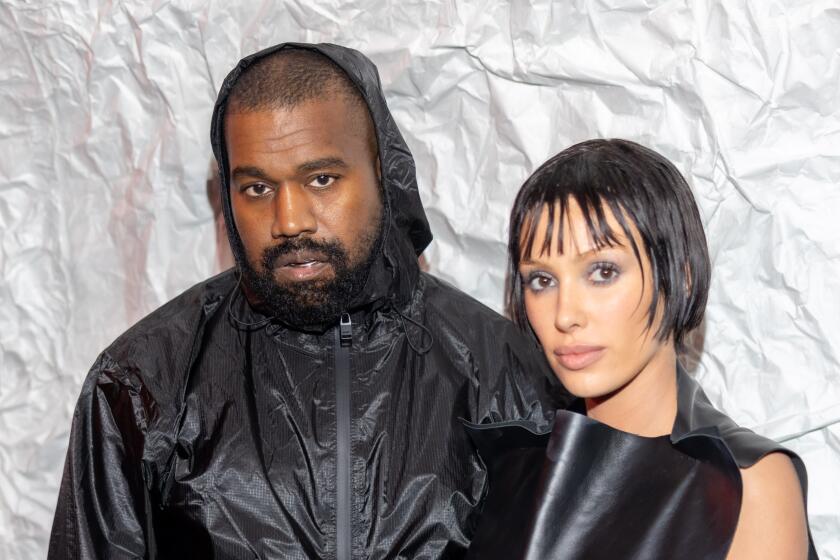SpiralFrog offers free songs -- with a catch
With plummeting CD sales making new business models imperative, some major record labels are offering more of their most prized content free of charge -- though not free of hassle.
In one of the bolder experiments to date, SpiralFrog.com, a service scheduled to open today, will let Web surfers download songs by U2, Timbaland, Amy Winehouse and other Universal Music Group artists free.
The catch: Consumers have to wait 90 seconds for each track to download, and they must answer questions each month about their buying habits.
In addition, the songs can’t be played on iPods or burned onto CDs as they can with 99-cent downloads from the dominant online music store, Apple Inc.’s iTunes.
SpiralFrog.com gets paid by displaying online banners and other advertising, but it leaves the music uninterrupted by radio-like commercials. The revenue from advertisers, which so far include Chevrolet and the U.S. Army, is to be split, with the labels and music publishers getting more than half of the total.
SpiralFrog Inc. joins a tiny number of companies offering free downloads of major-label content, as opposed to digital streams that can’t be saved on a computer. Another service, Ruckus.com, offers free downloads from the biggest labels only to students. The launch of an authorized, ad-supported peer-to-peer service called Qtrax has been delayed.
They are all part of the record labels’ effort to keep people from turning to illegal download sites for free music.
“It’s great that the industry is experimenting and still trying to figure things out,” digital media analyst David Card of Jupiter Research said. “I do think someone is going to figure out how to do ad-supported music on the Internet.”
The industry would prefer subscription services, but none of them has taken off despite efforts by major companies such as Yahoo Inc. and RealNetworks Inc. So the record labels are ranging further in pursuit of permanent downloads on terms that aren’t dictated by Apple Chief Executive Steve Jobs.
If ad-supported music on the Web one day becomes as common as commercial-supported radio is today, SpiralFrog may be entitled to claim that it paved the way.
“At some point, it could be the primary distribution system for music where the record industry actually gets paid,” said Scott Stagg, a Connecticut hedge fund manager who invested in SpiralFrog. “This is a very viable alternative to selling music because clearly that mode is broken. This is very similar to TV: You get it for free and the advertisers pay the money.”
Like other pioneers, SpiralFrog has faced a long and hard road to get where it is. Despite a deal with Universal, the world’s largest record label, the New York company’s survival is far from assured.
SpiralFrog spent most of the last four years figuring out a business model, raising money and haggling over terms with the labels. It has burned through more than $10 million in funding and shed a number of its top managers trying to get off the ground.
In an Aug. 31 Securities and Exchange Commission filing, the privately held company said that it could need as much as $18 million more to get through the next year and that it planned to sell stock in a private placement.
Other signs of trouble include the fact that Stagg’s Distressed/High Yield Trading Opportunities Fund could convert its debt into ownership of a quarter of the company, as well as the inclusion of a number of errors in the SEC document. As one example, the main company phone number listed in the regulatory filing, which was submitted because of a deal with existing investors, wasn’t valid as of Friday.
Finally, although the company stresses that it has sold Universal Music Group on the concept of revenue-sharing, the filing shows that SpiralFrog had to pay the record company $2 million as an advance against that revenue.
Although Universal and the other labels declined to discuss SpiralFrog on the record, executives at two labels said they had serious doubts about the company’s prospects. The executives said Universal and the others were interested in cutting a range of digital deals in hopes that some would pan out.
SpiralFrog’s struggle is partially the result of the labels’ reluctance to fully embrace the ad-supported model, analyst Card said.
That ambivalence might turn off consumers as well. Among the drawbacks to SpiralFrog are the 90-second wait time that SpiralFrog founder and Chairman Joe Mohen said music-rights owners demanded; the absence thus far of music from the other three major record labels; required monthly visits to the site to keep the music playable; and mandatory survey questions on such topics as how often users attend concerts and whether they are more inclined to buy a band’s music if they agree with the group’s political statements.
Probably the biggest negatives are that the tracks can’t be burned onto blank CDs, and they can be transferred only to Windows-compatible mobile players and phones. That leaves out Apple’s market-leading iPod.
Ruckus offers instant downloads, though also without burning capability. It doesn’t allow portability, even to Windows devices, unless users pay a $20 annual fee.
Mohen said the lack of mobility wasn’t crucial because more people listen to digital music at their computers than on the go.
That’s true for Americans generally, according to a survey by NPD Entertainment. But listeners ages 13 to 17 say they use portable players for music more than any other device, including PCs and radios.
--
--
(BEGIN TEXT OF INFOBOX)
Humming along
How people are listening to music these days:
*--* -- All ages 18-25 13-17 Over-the-air radio 70% 59% 59% CDs in a CD player 52 56 52 Digital files on computer 29 52 51 Portable digital player 27 37 64 CDs in a computer 20 28 33 *--*
Source: NPD Group survey
More to Read
The biggest entertainment stories
Get our big stories about Hollywood, film, television, music, arts, culture and more right in your inbox as soon as they publish.
You may occasionally receive promotional content from the Los Angeles Times.






